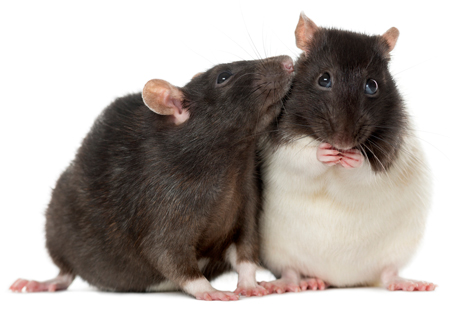Rat Poison Toxicity in Dogs

Rodenticides are poisons that are used to control nuisance mice and rats. They are widely available, and many people use them in their homes and on their property.
Unfortunately, rodenticides will kill any mammal that ingests them.
How Does Rat Poison Work?
Different active ingredients are used in various rodenticides. Each of them is dangerous to dogs in differing ways. Here are the most common ingredients in rat poisons, according to petpoisonhelpline.com (Liz Greenlee, 2011), and how they work:
- Long-acting anticoagulants. Rat poisons that contain these as an active ingredient work by disrupting the blood-clotting mechanisms in an animal's body. The result is that the animal bleeds to death internally. Signs may take 3-5 days to appear after an animal ingests this type of poison. If it is caught early enough, anticoagulant poisoning can be treated with aggressive vitamin K therapy.
- Vitamin D3, cholecalciferol. Rodenticides that contain vitamin D3 as an active ingredient work by causing high calcium and phosphorus levels in the animal's body. This leads to kidney failure, usually within 3 days of ingestion. Treatment is supportive care such as aggressive intravenous fluid administration. This is an extremely dangerous type of poisoning.
- Bromethalin. This active ingredient causes brain swelling and associated seizures, wobbliness, coma, and death in animals. Signs can occur anywhere from 2-36 hours after ingestion of a poison containing bromethalin. Treatment is aggressive supportive care and medications to decrease brain swelling.
- Zinc and aluminum phosphatides. Once ingested, these poisons create phosphine gas in the animal's stomach, which causes vomiting, diarrhea, liver failure, seizures, and shock. When a dog vomits up this poison, the gasses can affect humans and other animals in the area. Treatment is the removal of as much of the poison as possible from the stomach as well as antacid treatment and supportive care. Because of the danger of vomited material to humans, extreme care must be taken when dealing with this toxicity.
If you suspect that your dog may have ingested any type of rodenticide, call your veterinarian, an emergency veterinary clinic, or the pet poison helpline at 855-764-7661 immediately. If you know what type of poison your dog got into, have the package available.
Secondary Poisoning from Rodenticides
It's important to note that animals can be poisoned by eating a rodent that ingested rat poison. This happens more commonly with cats, raptors, and other natural predators of rodents, but it is possible for a dog to be poisoned this way as well. Dogs may catch and eat a sick rodent before it dies from rodenticide ingestion or scarf up a dead mouse that was poisoned.
Use Other Pest Control Protocols
Rodenticides are extremely dangerous to have around your home or property. They can be lethal to dogs, cats, other wildlife, and children who may ingest them.
Using other pest control protocols is highly preferable to rat poison for controlling rodents.
Works Cited
- Liz Greenlee, C. E. (2011, Feb. 28). Mouse and Rat Poison: Rodenticides Poisonous to Dogs & Cats. Retrieved from petpoisonhelpline.com.
You May Also Like These Articles:
Why Is Chocolate Bad for Dogs?
Foods Toxic to Dogs - Slideshow
Sago Palms Are Extremely Toxic to Dogs
A Hidden Laundry Room Danger for Dogs: Laundry Pods
A New Dog Bowel Obstruction Risk You Need to Know About
Disclaimer: This website is not intended to replace professional consultation, diagnosis, or treatment by a licensed veterinarian. If you require any veterinary related advice, contact your veterinarian promptly. Information at DogHealth.com is exclusively of a general reference nature. Do not disregard veterinary advice or delay treatment as a result of accessing information at this site. Just Answer is an external service not affiliated with DogHealth.com.


